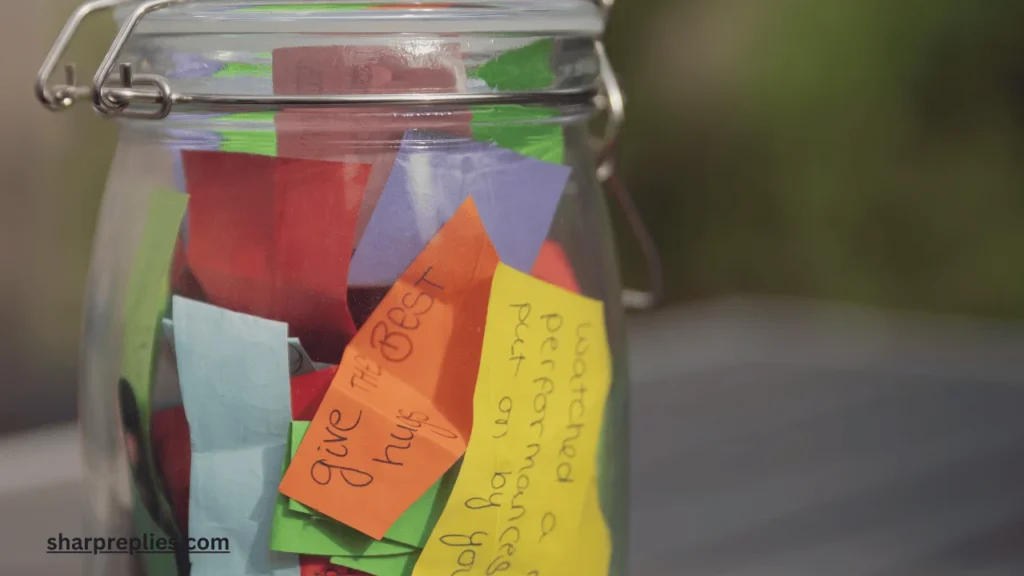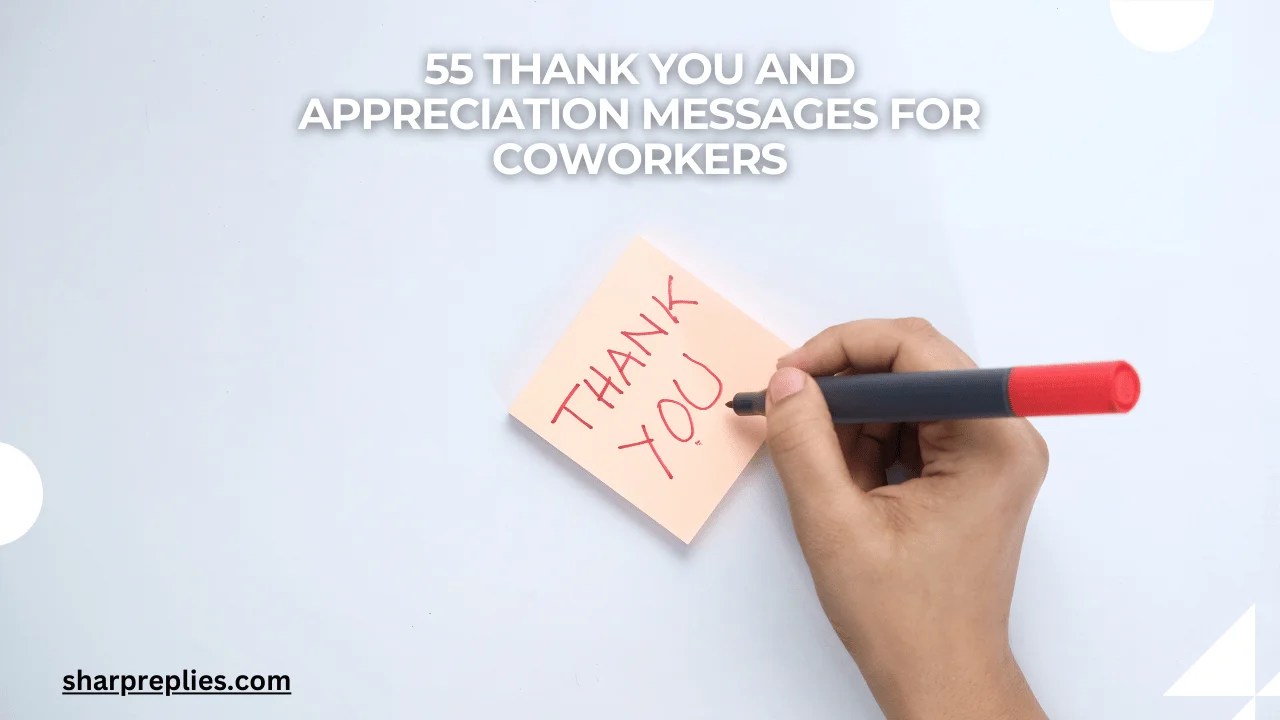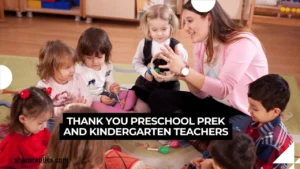In today’s fast-paced work environment, it’s easy to overlook the value of expressing appreciation to our coworkers.
Yet, simple thank-you messages can have a profound impact, boosting morale, fostering positive relationships, and encouraging a culture of respect and gratitude. In fact, research has shown that expressing appreciation in the workplace increases employee satisfaction, productivity, and overall team dynamics.
However, many of us struggle with finding the right words to convey our gratitude. Whether it’s for a job well done, a helpful gesture, or simply being a great team player, a heartfelt thank-you can make all the difference.
In this article, we’ll explore 55 thank-you and appreciation messages for coworkers, offering ideas and inspiration on how to show gratitude in a meaningful way.
Contents
- 1 The Significance of Appreciation in the Workplace
- 2 The Role of Thank-You Messages in Strengthening Relationships
- 3 Tailoring Your Thank-You Messages for Different Situations
- 4 How Thank-You Messages Foster a Positive Work Environment
- 5 55 Thank-You and Appreciation Messages for Coworkers
- 6 Conclusion:
- 7 FAQ’s
- 7.0.1 Why is it important to send thank-you messages to coworkers?
- 7.0.2 What are some examples of thank-you messages for coworkers who helped with a project?
- 7.0.3 How can I make my thank-you messages more meaningful?
- 7.0.4 Is it okay to send thank-you messages to coworkers via email?
- 7.0.5 How often should I send thank-you messages to my coworkers?
- 7.0.6 Can a thank-you message improve team dynamics?
The Significance of Appreciation in the Workplace
Gratitude is not just a nice gesture—it’s a powerful tool that shapes the work environment. When coworkers feel appreciated, they’re more likely to stay motivated, collaborate effectively, and remain committed to their work.
The act of showing appreciation can lead to stronger interpersonal connections and a sense of belonging. For managers, expressing gratitude isn’t just about making employees feel good—it’s about creating a culture that thrives on mutual respect and recognition.
Small gestures of appreciation can help break the monotony of the workday and remind everyone of the collective effort that drives success. It’s not just about saying “thank you,” but about conveying the message with sincerity and intention.
A well-timed thank-you message acknowledges a coworker’s effort, letting them know their contributions don’t go unnoticed. In turn, this fosters a positive work culture, where employees are more likely to go above and beyond, knowing their efforts are recognized and valued.
The Role of Thank-You Messages in Strengthening Relationships
Workplaces are often a mixture of diverse personalities, skills, and communication styles. While formal meetings and presentations are crucial, informal expressions of gratitude can go a long way in strengthening workplace relationships.
A simple thank-you message, whether delivered in person or through email, creates a sense of camaraderie and trust between colleagues. These messages signal that you see and value the work others are doing, which can be especially powerful in high-stress environments.
When sending a thank-you message, be specific about what you’re appreciating. Highlighting the actions that made a difference shows that you’re paying attention and care about the impact someone’s work has had on the team.
For example, instead of a generic “Thank you for your help,” try something like, “Thank you for your insightful feedback on the project. Your suggestions really helped improve the final outcome.” This kind of personalized recognition is not only more meaningful but also deepens professional bonds.
Tailoring Your Thank-You Messages for Different Situations
Not all thank-you messages are the same. Depending on the situation, the tone and content of your message will vary.
Whether you’re thanking a coworker for their hard work on a project, supporting you during a busy week, or offering guidance, context matters when crafting your message. It’s important to tailor your appreciation to the specific situation to make the recipient feel truly valued.
For example, if you’re thanking someone for stepping in during a crisis or covering for you, the message should reflect the extra effort they put in. On the other hand, if you’re expressing gratitude for a routine task, your tone can be lighter, but still sincere.
A well-crafted thank-you message acknowledges both the effort and impact of the action, making the appreciation more meaningful. Regardless of the context, be sure to express genuine thanks and recognize the significance of the gesture.
How Thank-You Messages Foster a Positive Work Environment
A culture of gratitude starts with individual actions. When we take the time to thank our coworkers, we’re contributing to an environment where positivity is the norm. This creates a ripple effect: as one person shows appreciation, others are more likely to do the same.
The result is a cycle of kindness that strengthens team cohesion and enhances workplace morale.
In a world where deadlines, targets, and emails can sometimes create a cold, impersonal atmosphere, thank-you messages offer a personal touch that humanizes the workplace. By making it a habit to express appreciation, you’ll foster a more inclusive and supportive atmosphere.
People will feel more connected to each other and more motivated to support one another, which can improve overall team performance and job satisfaction.
55 Thank-You and Appreciation Messages for Coworkers
Here are 55 examples of thank-you and appreciation messages you can send to your coworkers. These can be used for a variety of situations to show your gratitude and build stronger relationships at work:
- “Thank you for always stepping up when we need you. Your reliability is truly appreciated.”
- “I can always count on you for your expertise and support. Thanks for being such a great colleague.”
- “I really appreciate the time and effort you put into this project. You made a huge difference!”
- “Thanks for your positive attitude and for keeping the team motivated. You’re a great asset.”
- “Your insights during the meeting today were invaluable. Thanks for always thinking outside the box!”
- “Thank you for making the office a brighter place. Your sense of humor and warmth are contagious.”
- “I’m so grateful for your assistance during the busy period. You were a lifesaver!”
- “You’ve gone above and beyond. Thank you for your dedication and hard work.”
- “Your attention to detail is always impressive. Thanks for catching that mistake—it made a big difference.”
- “Thank you for being so patient and understanding. Your support has made a real impact on me.”
- “I appreciate your creativity and willingness to collaborate. It’s always a pleasure working with you.”
- “Thank you for being a team player and always making sure we reach our goals together.”
- “Your commitment to excellence is inspiring. Thanks for setting such a high standard for all of us.”
- “I’m so thankful for your mentorship and guidance. It’s made such a positive difference in my professional growth.”
- “Thank you for your hard work on the recent project. It wouldn’t have been the same without you.”
These messages can be tailored to different situations—whether you want to recognize someone’s effort, offer encouragement, or just say “thank you” for their presence in the workplace.

Conclusion:
Incorporating thank-you messages into your daily work interactions is more than just a nice gesture; it’s a practice that strengthens your professional relationships and nurtures a culture of appreciation. Whether you’re acknowledging a coworker’s effort or simply expressing gratitude for their support, these messages are small acts that can lead to big changes. Gratitude fosters a work environment where people feel valued, motivated, and connected—key elements in achieving both individual and collective success. By taking the time to send a thoughtful thank-you note, you’re contributing to a positive, productive, and supportive workplace that benefits everyone.
FAQ’s
Why is it important to send thank-you messages to coworkers?
Thank-you messages enhance morale, build stronger relationships, and foster a positive work culture by showing appreciation for colleagues’ efforts.
What are some examples of thank-you messages for coworkers who helped with a project?
Examples include: “Thank you for your hard work on the project. Your contributions were invaluable” or “Your input during the project made a huge difference. Thanks so much!”
How can I make my thank-you messages more meaningful?
Be specific about what you’re thanking the person for, personalize the message, and convey sincerity in your words.
Is it okay to send thank-you messages to coworkers via email?
Yes, email is a great way to express gratitude, especially in professional settings. Just ensure your message is clear and thoughtful.
How often should I send thank-you messages to my coworkers?
Regularly, but don’t feel the need to do it excessively. A well-timed thank-you message after a significant effort or accomplishment is ideal.
Can a thank-you message improve team dynamics?
Absolutely. Showing appreciation creates a culture of respect, promotes collaboration, and helps team members feel valued.








